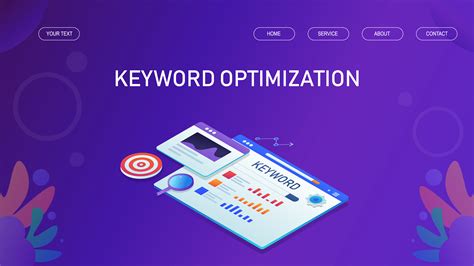When it comes to improving the position of your website on search engine results pages, there are several strategies you can employ. By implementing these techniques, you can effectively enhance the visibility and attractiveness of your site to both users and search engines alike.
1. Emphasize the importance of creating high-quality, valuable content. Engaging and informative articles not only attract users, but also demonstrate your authority in your niche.
2. Utilize appropriate keywords throughout your website to optimize its relevance to search engine algorithms. However, ensure that your keyword usage remains natural and organic, as excessive keyword stuffing can harm your site's visibility.
3. Develop a user-friendly website design that is visually appealing and easy to navigate. By creating a seamless and intuitive user experience, search engines will recognize your site as valuable and deserving of a higher ranking.
4. Utilize meta tags effectively on your website. Craft unique and compelling meta titles and descriptions for each page, as these elements are often displayed in search engine results and can greatly impact a user's decision to click on your site.
5. Earn backlinks from reputable and authoritative sources. Backlinks serve as endorsements for your website and provide signals to search engines about its legitimacy and relevance. However, remember that quality is more important than quantity when it comes to backlinks.
6. Make use of header tags, such as H1, H2, and H3, to structure your content and highlight important sections. Search engines analyze these tags to understand the hierarchy and relevance of your content, potentially boosting your ranking.
7. Optimize your website's loading speed to enhance user experience. Slow-loading websites not only frustrate users but also receive penalties from search engines. Compress images, eliminate unnecessary scripts, and leverage browser caching to improve your site's loading time.
8. Leverage the power of social media to promote your website and attract a larger audience. By sharing your content on platforms such as Facebook, Twitter, and LinkedIn, you can increase its visibility and encourage others to link back to your website.
9. Stay up to date with the latest search engine algorithms and adapt your strategies accordingly. As search engines continually refine their ranking methods, staying informed and adjusting your tactics is crucial to maintaining and improving your position.
10. Monitor and analyze your website's performance using tools such as Google Analytics. By tracking important metrics like organic traffic, bounce rate, and conversion rate, you can identify areas for improvement and make data-driven decisions to optimize your website's search engine ranking.
Implementing these techniques can help you enhance the visibility and search engine ranking of your website, ultimately driving more organic traffic and attracting a larger audience to your online platform.
Enhance the Loading Speed of Your Website for Better Performance

When it comes to optimizing your website for improved user experience and search engine visibility, one crucial aspect that shouldn't be overlooked is the load speed of your site. Ensuring that your website loads quickly is essential, as it not only impacts user satisfaction but also plays a significant role in search engine rankings and overall website performance.
A fast loading website not only impresses your visitors but also increases the chances of conversion and engagement. Slow-loading websites can lead to high bounce rates and negatively impact user experience, which in turn can affect your search engine rankings.
Optimizing your website's load speed involves various techniques, such as minimizing HTTP requests, compressing files, optimizing images, leveraging browser caching, utilizing content delivery networks (CDNs), and reducing server response time, among others. By implementing these strategies, you can significantly improve the loading speed of your website and provide a seamless browsing experience to your users.
Reducing the size of your HTML, CSS, and JavaScript files, as well as minifying them, can contribute to faster load times. Additionally, optimizing and properly compressing your website's images can help reduce file sizes without compromising the visual quality. Caching static resources and enabling browser caching can also enhance load speeds by serving previously accessed content directly from the user's device.
Another effective way to improve load speed is by using a content delivery network (CDN). CDNs distribute your website's files across multiple servers worldwide, allowing users to access the content from the server closest to their geographic location. This reduces latency, decreases data transfer time, and ultimately speeds up your website's load time.
Furthermore, optimizing your server's response time is crucial. This can be achieved by choosing a reliable hosting provider, ensuring sufficient server resources, and utilizing caching mechanisms, among other optimizations. Speeding up the server's response time helps reduce the time it takes to process user requests and deliver the requested content to their browsers.
In conclusion, optimizing your website's load speed is vital for providing an excellent user experience while improving search engine visibility. By implementing techniques such as reducing file sizes, compressing images, leveraging CDNs, and optimizing server response time, you can enhance the performance of your website and ensure it loads quickly for your visitors.
Create Compelling and Relevant Content for Better Online Visibility
One of the vital aspects of achieving a higher ranking on search engine result pages (SERPs) is the creation of high-quality, pertinent, and captivating content. In order to enhance your online visibility and attract more visitors to your website, it is essential to focus on delivering compelling information that is relevant to your target audience.
1. Craft Unique and Informative Content: Aiming to differentiate yourself from competitors, strive to produce original and informative content that offers valuable insights and solutions to your readers' queries. Engaging content not only helps establish your authority in the industry but also encourages other websites to link back to yours, which improves your website's visibility on search engines.
2. Optimize for Keywords: Conduct thorough keyword research and incorporate relevant keywords strategically throughout your content. However, avoid excessive keyword usage, as search engines penalize websites for keyword stuffing. Instead, naturally include keywords in your content to help search engines understand the context and relevance of your website.
3. Utilize LSI Keywords: Alongside primary keywords, using Latent Semantic Indexing (LSI) keywords can further enhance your content's relevance. LSI keywords are terms closely related to your topic, providing additional context to search engines and making your content more comprehensive and valuable to readers.
4. Create Engaging Headlines: Compelling headlines play a crucial role in grabbing users' attention and enticing them to click through to your website. Craft attention-grabbing headlines that accurately reflect the content within, and use phrases that pique curiosity or offer a solution to a problem.
5. Incorporate Multimedia Elements: Enhance the visual appeal and engagement of your content by incorporating relevant images, videos, infographics, or interactive elements. Well-placed multimedia elements not only make your content more enticing but also increase the time users spend on your website, indicating to search engines that your content is valuable.
6. Optimize Readability: Ensure that your content is easy to read and understand for your target audience. Break down your content into well-structured paragraphs and use bullet points, subheadings, and numbered lists when appropriate. Additionally, use a font size and style that is legible across all devices.
7. Provide Comprehensive Information: Aim to deliver comprehensive and detailed information on the topics you cover. By addressing common questions or concerns your target audience may have, you position yourself as a reliable source of information, enhancing your credibility and encouraging users to share your content.
8. Encourage Social Sharing: Incorporate social sharing buttons to make it easy for readers to share your content across different social media platforms. Social sharing not only increases your content's exposure but also indicates to search engines that your content is valuable and engaging.
9. Regularly Update Your Content: Continuously refresh and update your existing content with new information, statistics, or case studies to ensure its relevance and accuracy. Search engines favor websites that regularly update their content, as it signals that the website is active and providing up-to-date information.
10. Focus on User Engagement: Encourage user engagement by enabling comments or providing avenues for users to ask questions and interact with your content. Responding to commen
Optimize Your Website's Content with Relevant Keywords

Enhancing your website's visibility on search engine results requires strategic utilization of relevant keywords within your content. The incorporation of appropriate and meaningful terms empowers search engines to recognize the topic and purpose of your website, thereby improving its ranking in the search results. By employing well-chosen keywords throughout your content, you can attract targeted traffic and increase the chances of your website being discovered by potential visitors.
To effectively optimize your content with relevant keywords, it is crucial to conduct extensive research and analysis. The process involves identifying the most sought-after terms related to your website's subject matter and understanding the language preferences of your target audience. Once you have compiled a comprehensive list of relevant keywords, it is essential to seamlessly integrate them into different sections of your website, such as titles, headings, paragraphs, and meta descriptions.
When utilizing keywords, it is important to maintain a natural and cohesive flow of your content. Avoid overstuffing your website with excessive keywords, as this can be perceived as spamming by search engines and might lead to penalties. Focus on maintaining the readability and relevance of your content while strategically placing keywords in a way that enhances the overall user experience. By striking a balance between keyword optimization and compelling content creation, you can ensure that your website not only pleases search engines but also engages and appeals to your visitors.
Additionally, keep in mind that search engine algorithms continue to evolve, placing increasing importance on user intent and context rather than just specific keyword matches. As such, create high-quality and informative content that naturally incorporates relevant keywords to cater to the needs and expectations of your audience. Encourage user engagement, such as comments and social media sharing, as this can further enhance your website's search engine ranking.
In summary, using relevant keywords in your website's content is a vital aspect of improving its search engine ranking. By conducting thorough research, seamlessly incorporating keywords, and maintaining an engaging and user-friendly content, you can attract targeted traffic and increase your website's visibility. Remember, optimizing your content goes beyond just keyword placement; it is about creating a valuable and meaningful experience for your visitors and search engine users alike.
Enhance Your Website's Visibility with Effective Meta Tags and Descriptions
When it comes to improving your online presence and increasing the visibility of your website, implementing proper meta tags and descriptions is an essential strategy. These elements play a crucial role in helping search engines understand the content and purpose of your website, making it easier for them to rank it higher in search results. In this section, we will explore the importance of meta tags and descriptions and provide practical tips on how to optimize them for better search engine rankings.
| Benefits of Proper Meta Tags and Descriptions | Guidelines for Optimizing Meta Tags and Descriptions |
|---|---|
1. Improves Click-Through Rates: 2. Enhances User Experience: 3. Increases Relevance: 4. Boosts Search Engine Rankings: | 1. Use Relevant Keywords: 2. Write Compelling Descriptions: 3. Keep it Concise: 4. Utilize Unique Meta Tags: |
The first step towards effective optimization of meta tags and descriptions is to include relevant keywords that accurately represent the content of your website. By utilizing targeted keywords, search engines can better determine the relevance of your website to specific search queries. Additionally, crafting compelling descriptions that entice users to click on your website's link in search results can significantly improve your click-through rates.
When writing meta tags and descriptions, it is crucial to keep them concise and to the point. Search engines display limited characters for these elements, so it is essential to prioritize the most important information. Furthermore, each page on your website should have unique meta tags to avoid duplication and confusion for search engines.
In summary, implementing proper meta tags and descriptions is a vital aspect of improving your website's visibility and search engine rankings. By following the guidelines mentioned in this section, you can optimize these elements effectively and attract more organic traffic to your website.
Improve your website's accessibility and enhance user experience on mobile devices

In this section, we will discuss strategies to enhance the usability and mobile-friendliness of your website, thereby improving its accessibility and ensuring a seamless experience for your users. By implementing these techniques, you will make your website more user-friendly, responsive, and easily accessible on different devices, leading to increased engagement and satisfaction among your visitors.
1. Optimize for mobile devices:
- Design your website to be responsive and adaptable to different screen sizes and resolutions. This ensures that your content is easily readable and accessible on mobile devices.
- Implement mobile-friendly navigation, making it easy for users to navigate your website on smaller screens.
- Reduce page load times by optimizing images and minimizing the use of scripts and plugins.
2. Ensure clear and concise content:
- Use clear headings and subheadings to organize your content. This helps users quickly understand the structure and navigate through your website.
- Keep paragraphs and sentences short, using concise language to deliver your message effectively.
- Use bullet points and lists to convey information in a scannable format, making it easier for mobile users to consume your content.
3. Provide alternative text for images:
- Add descriptive alt text to your images, enabling visually impaired users to understand the content within the images.
- Include relevant keywords in your image alt text to enhance the SEO value of your website.
4. Implement accessibility features:
- Ensure proper color contrast between text and background to accommodate users with visual impairments.
- Provide text alternatives for non-text elements, such as videos and audio files, to make your content accessible to everyone.
- Make sure your website is compatible with screen readers and assistive technologies.
5. Test and monitor accessibility:
- Regularly test your website for accessibility using tools like screen readers and automated accessibility checkers.
- Monitor user feedback and make necessary adjustments to improve the accessibility and usability of your website.
By focusing on improving your website's accessibility and mobile-friendliness, you will not only enhance the user experience but also improve your search engine visibility and drive more organic traffic to your website. Remember, creating an inclusive and user-friendly website benefits both your users and your business.
Enhance the Connectivity of Your Website's Internal Links
A well-structured internal linking system plays a vital role in optimizing your website for better visibility and user experience. By strategically connecting your website's pages through interlinking, you can significantly improve your online presence and enhance the overall performance of your website.
Efficient internal linking allows search engines to crawl and index your web pages more effectively. It not only helps search engine bots understand the hierarchy and importance of your website's content but also provides an organized navigation for users, making it easier for them to explore and discover relevant information.
By carefully crafting the anchor text, choosing relevant pages to link to, and avoiding excessive linking, you can enhance the internal connectivity of your website. This strategic interlinking helps to distribute the link authority of your website across different pages, which can boost the overall search engine ranking of your website.
Additionally, implementing a well-structured internal linking system enables you to guide the flow of link juice and authority to your most important pages, such as your landing page or key product/service pages. This can improve their visibility in search engine results and increase the likelihood of attracting more organic traffic.
It's essential to periodically audit and optimize your internal linking structure to ensure that it aligns with the current goals and objectives of your website. By paying attention to the relevance, context, and visibility of your internal links, you can continually improve the overall navigation and accessibility of your website's content.
In conclusion, enhancing your website's internal linking structure is a fundamental aspect of search engine optimization. A well-organized interlinking system not only helps search engines crawl and index your web pages efficiently but also provides users with a seamless navigation experience. By strategically interlinking relevant pages and optimizing anchor texts, you can boost your website's visibility, authority, and overall search engine ranking.
FAQ
How can I improve my website's search engine ranking?
There are several tips that can help boost your website's search engine ranking. Some of these tips include optimizing your website's content with relevant keywords, improving the loading speed of your pages, creating high-quality backlinks, and regularly updating your website with fresh and engaging content.
What is the importance of optimizing my website's content with keywords?
Optimizing your website's content with relevant keywords is crucial because it helps search engines understand what your website is about. By including popular and relevant keywords in your content, you increase the likelihood of your website appearing in search engine results when users search for those keywords.
How can improving the loading speed of my website positively impact its search engine ranking?
The loading speed of your website plays a significant role in its search engine ranking. Search engines tend to prioritize websites that offer a fast and seamless user experience. By optimizing your website's loading speed, you reduce the bounce rate, increase user engagement, and improve your chances of ranking higher in search engine results.



